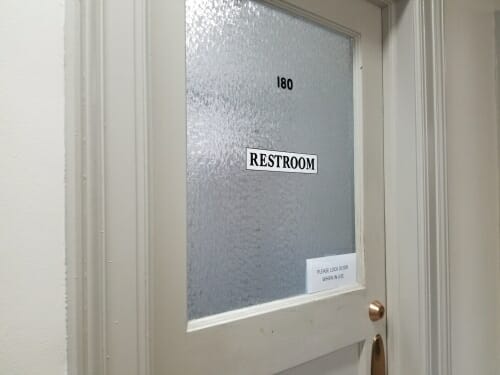New policy will create more gender-inclusive restrooms on campus
The University of Wisconsin–Madison will create more gender-inclusive restrooms – single-stall, locking restrooms – under a newly adopted policy developed by a campus task force.
The Gender Inclusive Restroom Facilities Policy requires a minimum number of such facilities to be provided in new and renovated buildings – at least one on the first floor and, to the extent possible, at least one on every other floor.

A gender-inclusive restroom in Bascom Hall.
“This new policy formalizes efforts that have been under way on our campus to ensure that we have facilities in place to make everyone feel safe and welcome,” says Laurent Heller, vice chancellor for finance and administration. “While one important goal is to ensure that transgender and gender nonconforming people may use facilities without fear of harassment, policies like this also support families with young children, individuals with disabilities and people who employ personal care assistants.”
Beyond those positive changes, campus and community members should not notice a difference in their facility experience; they may see new signage near all types of restrooms helping with wayfinding and clarifying the policy.
The policy also states that students, faculty, staff, visitors and guests may use the restroom, locker room or changing facility in which they feel safest and most comfortable.
UW Health and the University of Wisconsin–Milwaukee are among the institutions with similar policies. The policy also aligns with University Housing’s Student-Community Expectations.
Currently the university has approximately 145 single-stall, locking restrooms that can be located using an online campus map. Under the new policy, the university expects to add additional facilities over the next several years. Read an FAQ about the policy.
The policy was developed by the Gender Inclusive Restroom Facilities Task Force, a shared governance group formed in 2017. The task force is made up of representatives from University Housing, Facilities Planning & Management, the Committee for GLBTQ People in the University, the Gender and Sexuality Campus Center, as well as students, faculty, university staff and academic staff. Members consulted with campus partners including the University of Wisconsin Police Department, the Parent & Family Program, Recreation and Wellbeing, and University Health Services to ensure the policy meets needs across campus.
The task force was charged and the policy was approved by Heller and then-Provost Sarah Mangelsdorf.




